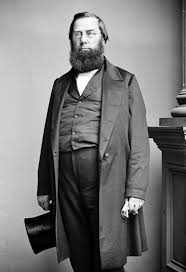
George P. Marsh
George Perkins Marsh (March 15, 1801 - July 23, 1882), an American diplomat and philologist, is considered by some to be America's first environmentalist and by recognizing the irreversible impact of man's actions on the earth, a precursor to the sustainability concept, although "conservationist" would be more accurate. The Marsh-Billings-Rockefeller National Historical Park in Vermont takes its name, in part, from Marsh. His 1864 book Man and Nature had a great impact in many parts of the world. George Perkins Marsh was born in Woodstock, Vermont, to a prominent family. His father, Charles Marsh, had been a member of the U.S. House of Representatives. George Marsh graduated from Phillips Academy, Andover, Massachusetts, in 1816 and from Dartmouth College with highest honors in 1820. He studied law in Burlington, Vermont, was admitted to the bar in 1825, and practiced law in Burlington. He also devoted himself to philological studies. In 1835 he was appointed to the Executive Council of Vermont, and from 1843 to 1849 was a Whig representative in Congress.[citation needed] He served as an editor of Ancient Monuments of the Mississippi Valley which was published in 1848. In 1849 President Zachary Taylor appointed Marsh United States minister resident in the Ottoman Empire. He rendered valuable service to the cause of civil and religious toleration in that empire. In 1852-1853, he discharged a mission to Greece in connection with the imprisonment of American missionary Jonas King. He accomplished this task with a vigor that surprised the diplomats of Athens and showed a masterly knowledge of the Greek constitution and legislation, as well as of international law. Marsh was elected a member of the American Antiquarian Society in 1851. He returned to Vermont in 1854. In 1857 he was appointed by the governor of Vermont to make a report to the legislature in regard to the artificial propagation of fish. He had previously been appointed one of the commissioners to rebuild the state house at Montpelier and in 1857 was appointed as the state railroad commissioner, succeeding Charles Linsley. In 1861, President Abraham Lincoln appointed Marsh the first United States minister to the Kingdom of Italy. Marsh would go on to be the longest-serving chief of mission in U.S. history, serving as envoy for 21 years until his death at Vallombrosa in 1882. He is buried at the Protestant Cemetery in Rome.


